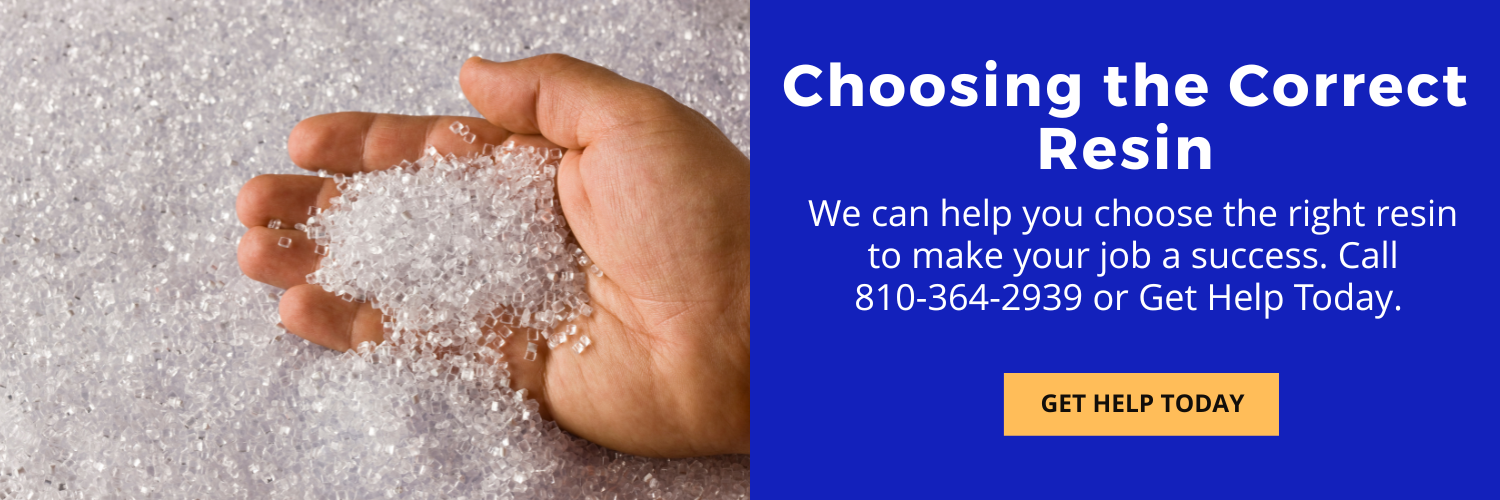There is a wide range of resins used in manufacturing plastic components. Choosing the right one depends on a number of factors. That’s why it’s good to work with an expert. Let’s take a look at the range of resins available.
Low/Medium Cost Injection Mold Plastic Resin
Acetal (often abbreviated as POM): This sometimes shows up under the trade names Celcon, Delrin, Hostaform, or Lucel. It’s a strong, rigid resin with excellent fatigue, chemical, moisture, and creep resistance. In its natural states it’s opaque white. This is good for a number of applications, such as bearings, cams, gears, plumbing components, rollers, rotors, slide guides, or valves.
Acrylic (PMMA) (Diakon, Oroglas, Lucite, or Plexiglas): Acrylic is a rigid, brittle, but scratch resistant transparent resin that’s good for applications needing optical clarity (such as lenses or reflectors).
Acrylonitrile Butadiene Styrene (ABS) (Cycolac, Magnum, Novodur, or Terluran): ABS is strong and flexible with low mold shrinkage. Good for applications needing chemical resisitance, electroplating, and natural opacity. Used for automotive applications.
Polyethylene – Low Density (LDPE) (Alkathene, Escorene, or Novex)
Polyethylene – High Density (HDPE) (Eraclene, Hostalen, or Stamylan) Where LDPE is lightweight, tough, and flexible, HDPE is tough and stiff. Both have excellent chemical resistance and a natural waxy appearance. Both are good for housings, covers, and containers.
Polypropylene (PP) (Novolen, Appryl, or Escorene): This is a lightweight, heat resistant resin with high chemical and scratch resistance. It’s tough and stiff with a natural waxy appearance. Used in automotive components.
Polystyrene – General purpose (GPPS) (Lacqrene, Styron, or Solarene)
Polystyrene – High impact (HIPS) (Polystyrol, Kostil, or Polystar) Where GPPS is brittle and transparent, HIPS has good impact strength and toughness while being translucent. GPPS is used in cosmetics packaging and pens, HIPS in electronic housings, food containers, and toys.
Polyvinyl Chloride – Plasticised (PVC) (Welvic or Varlan)
Polyvinyl Chloride – Rigid (UPVC) (Polycol or Trosiplast) Both of these resins are tough, flexible, flame resistant, and can be transparent or opaque. PVC is good for electrical insulation and housewares, while UPVC is good for outdoor applications lie drains, or gutters.
Styrene Acrylonitrile (SAN) (Luran, Arpylene, or Starex): This is a stiff, brittle, chemical and heat resistant resin that’s hydrolytically stable and transparent. Often used for housewares and syringes.
Medium/High Cost Injection Mold Plastic Resin
Polyamide6 (Nylon) (PA6): (Akulon, Ultramid, or Grilon): This is a high strength resin with fatigue and chemical resistance and low creep and friction. It’s almost opaque and good for bearings, bushings, gears, rollers, or wheels.
Polyamide 66 (Nylon) (PA6/6): (Kopa, Zytel, or Radilon): Similar characteristics to PA6 above. Good for handles, levers, small housings, or zip ties.
Polyester – Thermoplastic (PBT or PET): (Celanex, Crastin, Lupox, Rynite, or Valox): Rigid with good heat and chemical resistance, PBT is often used for automotive parts, bearings, cams, and electrical components.
Polyethere-therketone (PEEK): This is a strong resin with thermal stability, chemical resistance, abrasion resistance, and low moisture absorption. Used in aircraft components, electrical connectors, pump impellers, and seals.
High Cost Injection Mold Plastic Resin
Polycarbonate (PC):(Calibre, Lexan, or Makrolon) This is a very tough resin with good temperature resistance, transparency, and dimensional stability. Good for bottles, containers, housings, light covers, reflectors, safety helmets and shields.
Polyphenylene Sulphide (PPS): (Ryton or Fortron): PPS has a very high strength and heat resistance. Good for bearings, covers, fuel system components, guides, switches, and shields.
Thermoplastic Elastomer/Rubber (TPE/R): (Hytrel, Santoprene, or Sarlink): TPE/R is tough and flexible, Used for bushings, electrical components, seals, and washers.


